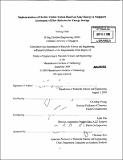Implementation of electric vehicle system based on solar energy in Singapore assessment of flow batteries for energy storage
Author(s)
Chen, Yaliang
DownloadFull printable version (54.53Mb)
Other Contributors
Massachusetts Institute of Technology. Dept. of Materials Science and Engineering.
Advisor
Yet-Ming Chiang and Andy Chu.
Terms of use
Metadata
Show full item recordAbstract
For large-scale energy storage application, flow battery has the advantages of decoupled power and energy management, extended life cycles and relatively low cost of unit energy output ($/kWh). In this thesis, an overview of various flow battery technologies has been presented, with comparison to other energy storage technologies available in the market. It has been found that though flow batteries generally have lower energy density than other electro-chemical storage systems, the easy scalability of energy/power capacity at very low O&M cost enables flow batteries to be one of the fastest emerging energy storage technologies. The intellectual property landscape of current flow battery market has also been reviewed. The three dominating flow battery technologies in the market are Regenesys polysulfide/bromide redox flow battery (PBR), zinc/bromine battery (ZBB) and all vanadium redox flow battery (VRB). VRB has been chosen for an in-depth analysis of its design and technology, mainly because of its halogen-free operation and superior electrolyte properties. A cost model based on VRB system has been built in the context of Singapore, and the Capital Cost per Cycle (CCPC) for a 250kW VRB system with 8 hours of discharge duration is estimated to be about $0.0828/kWh. However, this figure changes considerably with the materials' costs, the design of electrolyte and cell stack, as well as the power and energy capacity of the system. Based on this cost model, it is also investigated in this thesis that in view of the current electricity prices, it is economically unfeasible to implement VRB system for bulk electricity price arbitrage in Singapore. (cont.) The VRB-based flow battery system has also been evaluated together with other technologies, such as solar PV panels for electricity generation, in the implementation models in group project. The final conclusion is that at current electricity and oil price in Singapore, implementing "green technologies", such as electricity generation from solar energy with energy storage system, still faces tremendous financial barrier. Greater government incentives and higher fossil fuel price volatility are necessary for these green technologies to be viable in the near future.
Description
Thesis (M. Eng.)--Massachusetts Institute of Technology, Dept. of Materials Science and Engineering, 2009. Cataloged from PDF version of thesis. Includes bibliographical references (p. 192-198).
Date issued
2009Department
Massachusetts Institute of Technology. Department of Materials Science and EngineeringPublisher
Massachusetts Institute of Technology
Keywords
Materials Science and Engineering.